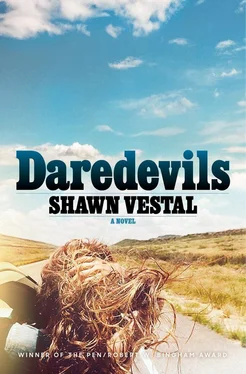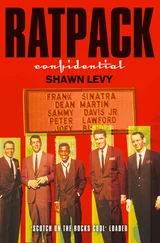“Need to replace those nipples yet?” Dad asks.
“Nope.”
“You keeping that white-faced bully out of the others’ milk?”
“Yep.”
Jason can feel his father struggling for a way in, and he is glad not to help. From the far back of the milking barn, across the pasture and the patch of rocky desert, he sees trucks and motorcycles gathering in the driveway of Grandpa’s house. Dean’s house. The yard light is on, and Dean and a few other men are unloading rolls of orange temporary fencing from the back of a half-ton truck. A few hundred yards down the road, on the other side of the house, two VW vans sit along the shoulder, and people mill about in the barrow pit. Jason knows from the morning paper that some bunny huggers from Sun Valley have planned a protest.
Jason says, “You going over?”
“Naw. I’ll pass.”
“I’m going.”
Dad nods. Takes off his hat and scratches furiously at his scalp. “There’s no way this can do anybody any good.”
Jason starts gathering the rest of the empties.
“You can come to think that doing what you want to do and ignoring everybody else is the right thing to do,” his dad says. “The honorable thing. Because everybody else is dumb or dishonest or mistaken or something. That’s what your uncle thinks — that everyone is just wrong about everything, and the only thing to do is ignore them. Maybe it is, sometimes. But usually the honorable thing to do is think about others. To consider others, and the way your actions might affect them.”
“Affect us, you mean.”
“I mean everybody. Us, too, but everybody. People all over the country are going to know about this. And when those reporters start writing about it, they might get more interested in your uncle and what’s going on over there. And then…”
“Then what?”
“Then the story gets all that much better.” He coughs. “Worse.”
The sun is all the way up now, air warming. They both know that whatever is happening with the story at Dean’s is already happening. It’s burning like a fire. Since Dean taped up Ruth’s handwritten signs on flag stationery at the co-op — JACKRABBIT DRIVE! YOU BRING A CLUB, WE’LL SUPPLY THE FOOD! — it has energized the town. Crop prices are lousy, the football team is losing, and people have fixed upon the bash. Kids talk about it at school. Some of the popular thugs are for it. Some object on the grounds that it is redneck and uncool. Certain farmers — the angry ones, the political ones — wrote letters to the editor of the Gooding County Leader, anticipating the criticism that would follow the event. “If New Yorkers don’t want us to harvest these pests, maybe they’d like to take them home to Central Park.”
“ And, ” Dad says, “this thing — it’s not just that it looks barbaric. It is barbaric. Just awful. You hate to see anyone enjoy something so bloody.”
He puts his hand on Jason’s shoulder and squeezes.
“Probably the least effective way to get rid of jackrabbits is to stand in the desert with a club and try to beat them all to death,” he says. “It’s just dumb.”
Jason ignores him and walks back toward the barn. He doesn’t want to bash any bunnies himself. But he’s absolutely going.
• • •
Loretta and Samuel set up the Zion’s Harvest table, while Dean and Bradshaw load fencing into a pickup. She has to remember to call him Baker. Zion’s Harvest is a big part of this day. “Two birds with one stone,” Dean said. It was Ruth’s idea; if they’re moving up here, they’ll need the business to grow fast, she reasoned; the rabbit drive is the best marketing opportunity they’ll have. She has a mind for that, Ruth does — for imagining what others need and how you might speak to it. Loretta and Samuel tape the butcher-paper sign to the front of the table, sitting at an angle to the driveway so everyone who drives or walks in will see it: ZION’S HARVEST BULK FOODS.
Ruth is alert to something in the air. Something with Bradshaw. Loretta felt it at breakfast — attention flowing from Bradshaw toward her, and Ruth’s awareness of it. Loretta feels them both watching her this morning. And she feels self-conscious about the drive, about the people who will be here, about the watching that will come with that. The noticing.
“Bring out some of them buckets,” she says to Samuel.
He’s moody, hanging his head because he’s not with the men.
“Go on,” she says. “And bring some flyers, too.”
At breakfast, Bradshaw had been scooping up huge mouthfuls of scrambled eggs. She noticed a dullness in her response to him that she’d never felt before. After months of Ruth’s horsey breakfasts, Loretta found herself more attracted to the steaming plate of eggs than to Bradshaw, sitting there sock footed and sleepy eyed. Loretta had looked eagerly to Ruth and asked, “Eggs?” Ruth approached with a bowl of oatmeal and dropped it in front of her. “Mush,” she said.
People drift into the driveway, clumping in groups and talking, cups steaming. Dean’s hired the auctioneer’s food truck to serve hot drinks and lunches. Everyone carries a baseball bat, or a length of pipe, or a two-by-four.
Bradshaw comes to the Zion’s Harvest table.
“Hidy, there, Lori,” he says, pretending to look at the clipboard where customers can sign up for the newsletter. “Holy Christ, I’m about to leap over this table.”
Loretta can see Ruth in the corner of her eye, pausing at the laundry line.
“Keep your powder dry,” she says. She pays meticulous attention to the sign, to making sure it is straight along the table.
“My powder,” Bradshaw says, “is about to blow.”
He adjusts his cap. Rubs his face. Takes a deep breath. Exhales. His face is strained and splotchy, and even across the table she can smell him — armpit and work clothes and a hint of the chasings of the night.
“I hope you’re ready, girl,” he says. “Because I am ready.”
He is not a demon or an angel or anything of the sort. She sees what he is, because he is surrounded by others just like him — bandy-legged men in fringe-heeled Wranglers and curl-toed boots, caps with their bills tight, some with chew-can rings in the back pocket, spitting, scuffing their heels, boring and dumb. He waits for her to respond to him, and something mean seeps into his look when she doesn’t.
“You are ready,” he says. “You are.”
• • •
Boyd shows up with his mom’s aluminum softball bat, the Tennessee Thumper, tapping it in the palm of his hand as Jason opens the door. He bounces on the balls of his feet like a prizefighter, the frayed bells of his jeans splashing softly around his ankles.
“Time to get some bunnies!” he says, as Jason emerges and they start walking over.
“I’m not getting any bunnies,” Jason says. “I’m a complete spectator.”
“You are such a pussy,” Boyd says happily. “You need to kill something.”
“That’s stupid.”
“Such a pussy.”
Boyd is as happy as Jason has seen him in weeks. He’s been bitchy and bleak since his mother refused to let him drive off to South Dakota for the American Indian Movement protest. Jason hadn’t understood it — hadn’t understood, even remotely, Boyd’s expectation that his mother would let him go — but Boyd took it as a grievous offense. “This fucking place,” Boyd said, disgusted. “This fucking town. This fucking school. This fucking point and time in the history of the fucking world.”
He and Boyd trudge through the days like prison inmates in a chow line. Jason picks him up for school every morning, they bitch and listen to Houses of the Holy, go to classes and meet again at lunch to bitch some more, return to afternoon classes, and meet again after school to bitch some more. Teachers, parents, cops, laws, principals, bishops, uncles, aunts, cousins, girls, cars, store clerks, waitresses, television stars, the bicentennial. Dean and Loretta. This could not be their lives. They could not breathe. Boyd kept saying he was going to the AIM protests anyway. There or somewhere.
Читать дальше












